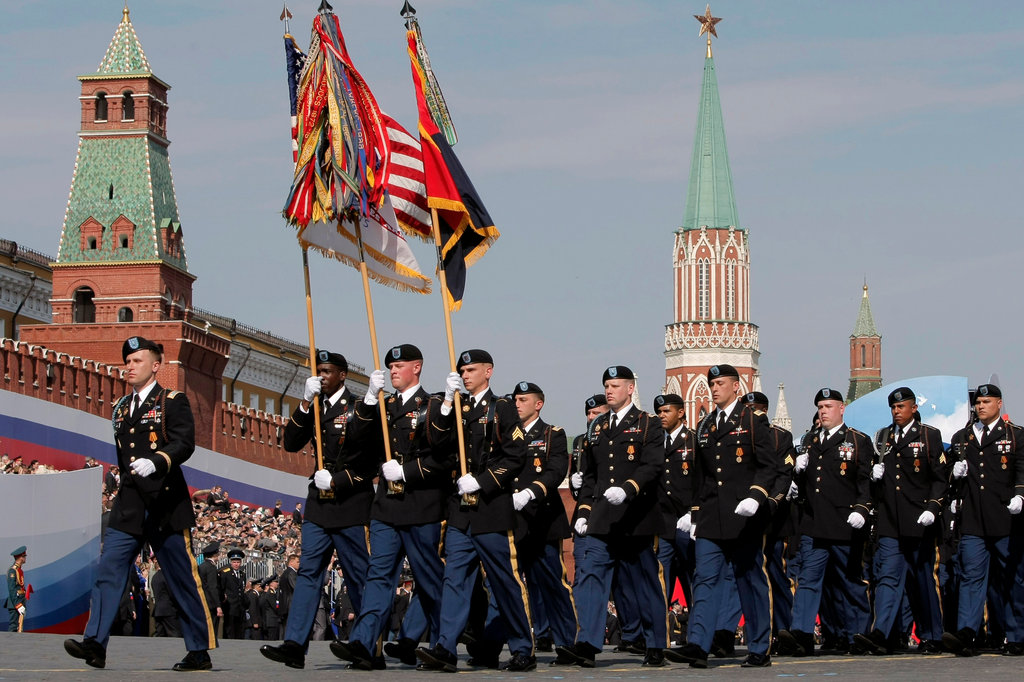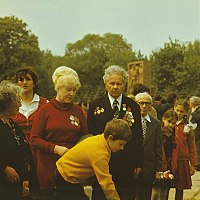IN RUSSIA
Today, public mourning, marches, and military parades all over Russia characterize Victory Day. Additionally, recently introduced to Victory Day is the March of the Immortal Regiment in which millions of Russian civilians assemble carrying a portrait of either a World War II veteran, victim or survivor (Sharkov, 2017). President Putin himself carried a portrait of his father. The younger generations are tasked with honoring the veterans and can also partake in various types of festivities organized by municipalities each year. Many people attend the Military parade and thousands gather to watch the celebratory fireworks show. The parade has become an opportunity for Russia to flex their muscles and showcase their military power (Arutunyan, 2016).
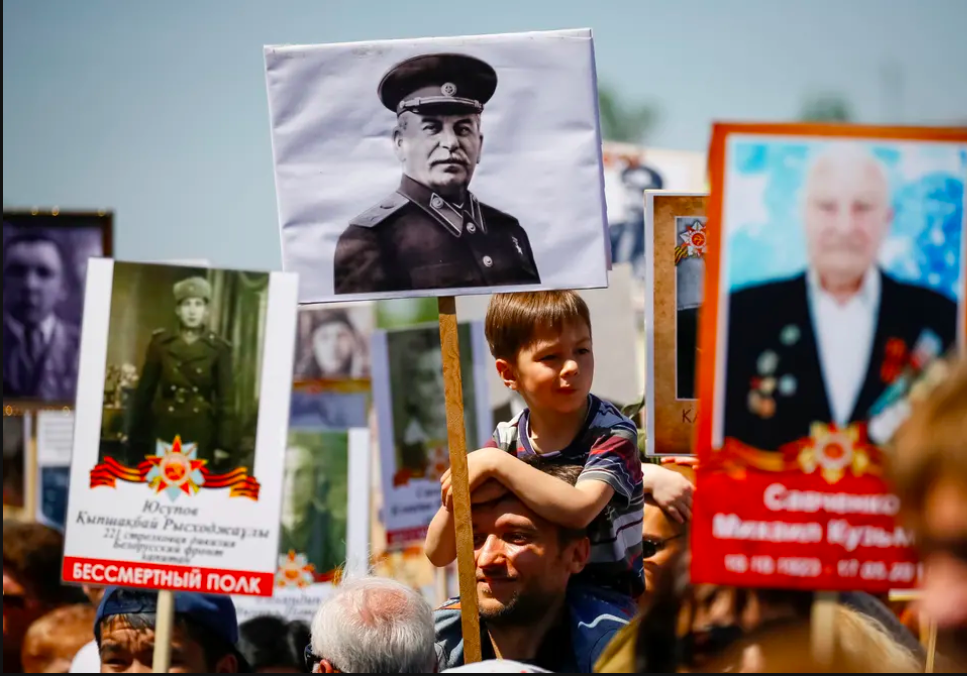
A young Russian carrying a picture of former leader Joseph Stalin during Victory Day celebrations
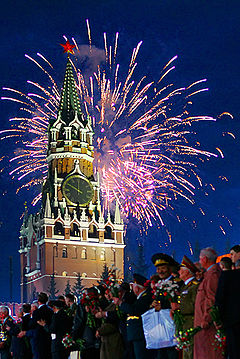
Victory Day fireworks in the Red Square in Moscow
Victory day has increasingly become a celebration in which popular culture plays a central role. Victory Day has become a very important topic in Russian cinema, literature, history lessons at school, the mass media, and the arts. All over Russia, TV networks broadcast World War II-inspired films. Also very popular is the Russian Victory Day song “Dan Pobedy” (Volkov, 2018). Another Victory Day tradition is to give red carnations to veterans in the street and to lay wreaths at the war memorial sites. Veterans walk the streets proudly displaying their medals. Another common symbol of Victory Day is the St. George ribbons worn by thousands of Russians. This black and yellow ribbon is a sign of respect and remembrance (Victory Day in Russia).

Soviet Veteran proudly displaying his medals on Victory Day while wearing a St. George Ribbon and holding a red carnation.
Despite the emotional connection of many Russian to Victory Day, today’s celebrations have become more of a celebration of the current state of the country as opposed to a day remembering the former sacrifices of the country. Many people believe that the goal of the contemporary celebration is strictly to demonstrate loyalty to Putin and that Putin has used World War Two as a tool to consolidate his power, diminishing the memory of the war itself (Arutunyan, 2016).
IN NEW YORK CITY
Despite the overall decline in American participation and acknowledgement of Victory Day celebrations, many Soviet veterans in Brighton Beach continue to celebrate Victory Day. Brighton Beach is known for its tight-knit Soviet community. Victory Day first became celebrated in Brighton Beach in the 1990’s along with the influx of former Soviet veterans to town. It became of the utmost importance to these Soviet veterans and they do whatever they can to mimic the celebrations in their homeland. They too watch Soviet World War II-inspired films and walk around proudly wearing military uniforms and displaying their Soviet war medals. Many people can also be seen wearing St. George ribbons and driving around with Soviet flags attached to their cars. It is not uncommon to see former soldiers walking around with red flags or images of Stalin (Sergeyev, 2015). Rafael Finkelshtyn, whose family emigrated from the Soviet Union in the 1990’s, said that his Victory Day is very important to his family. “My whole family gets together and we watch the celebrations in Moscow. Every year we watch a Soviet war documentary followed by a family dinner consisting of traditional Russian food and war stories told by my grandfather. The most important part of the day for my family is when we take out a picture of my great grandfather who was a cavalryman in the Red Army and pass around his medals for all his great grandchildren to admire.” he stated.
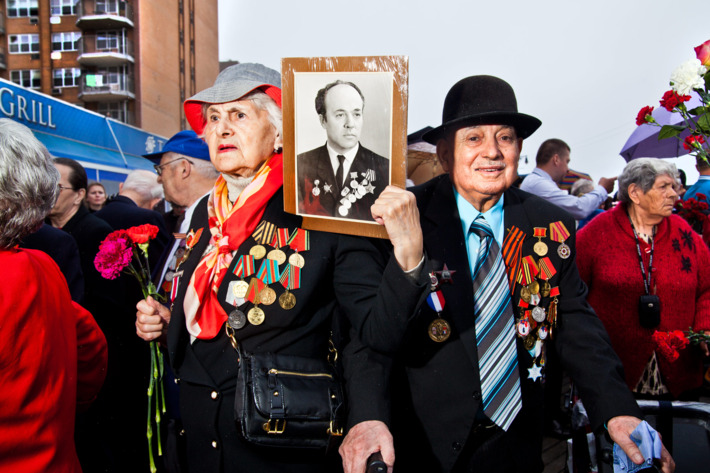
Members of Brighton Beach community celebrating Victory Day
The American Association of Invalids and Veterans of World War II host the annual Brighton Beach Victory Day Parade. Many people hold laminated photographs of family members who fought in the war to mimic the actions done in Russia. It has become increasingly popular to take pictures with the Veterans and hear their stories. The festivities of the day are concluded with several annual celebratory banquet dinners. Councilman Mark Treyger arranged one such celebration in 2018. At the event guests were fed Russian delicacies and enjoyed traditional Russian performances. Additionally, numerous Soviet veterans were honored (Mena, 2018). Olga Henkin, an associate executive director of a Russian-Jewish youth organization called Ezra, said, “I don’t believe there is a single family that doesn’t have someone who has been through that war. Each family has been impacted in a personal and an emotional way, and that has been engraved somewhere in their mind and in their soul.” Henkin’s organization spent Victory Day delivering gift bags to veterans to than them for their efforts (Berger, 2011). Due to this large-scale impact on all Soviet families, Victory Day is somewhat of a bittersweet day in Brighton Beach.
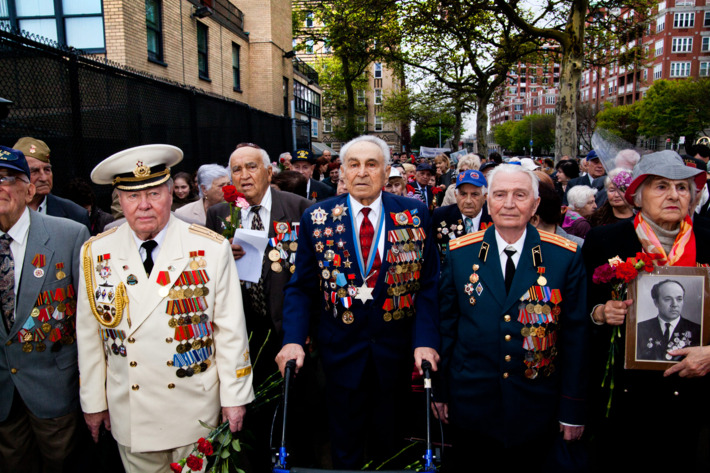
Soviet veterans marching in Victory Day parade in Brighton Beach
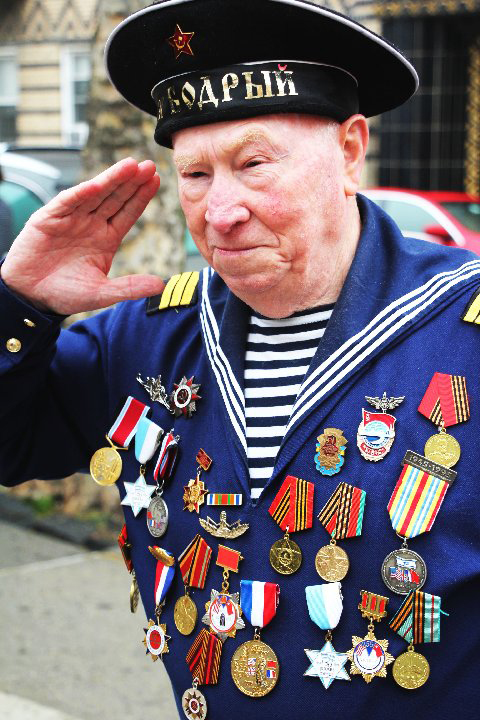
Soviet veteran proudly displaying his war medals in Brighton Beach
Raisia Chernina, a lead organizer of celebrations in Brighton Beach stated, “This event is not just about the war, but about how people survived the war.” 90-year-old Grigory Danilovich, who served in the Red Army at age 17, expressed that even during a celebration of the victory, memories of the war were painful. Leonid Rozenfeld, another Red Army veteran agreed with Danilovich. He said, “Even now, as I speak to you about this, my heart races and my eyes well with tears. I remember the millions of people who died because of these horrors, these atrocities, the killing, the death, the trauma, and the starvation” (Faynberg, 2016).
However, in recent years, participation in Victory Day is dwindling, as there are fewer and fewer Soviet veterans each year. Along with the veterans themselves, the majority of the participants of Victory Day in Brighton Beach have historically been immigrants. With the members of this generation growing increasingly old, along with the lack of participation in the celebration by the younger generations, there is a growing fear that Victory Day will be forgotten in America. The lack of participation of the younger generations is largely due to the fact that, unlike in Russia, Victory Day is not a national holiday in America. Therefore, children don’t have off from school and many adults are not of from work and therefore can’t partake in many of the celebrations (Sergeyev, 2015). Mr. Berman also highlighted the disconnect between younger generations and the meaning behind the day. He said, “Victory Day is a day commemorating Soviet history. There was a great deal of pride in the victory because of the sacrifice the country had to endure to be victorious. The younger generations will never feel this sacrifice and, sadly, many of the veterans who experienced the sacrifice aren’t around to tell their grandchildren and great grandchildren about it.”
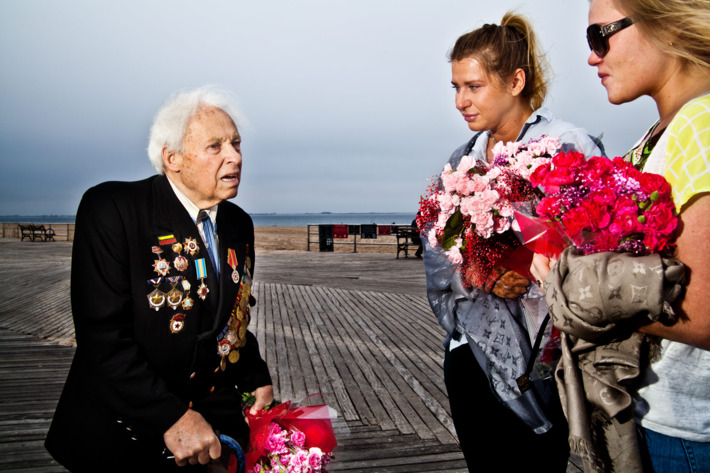
Soviet veteran in Brighton Beach enlightening the younger generation about Victory Day



